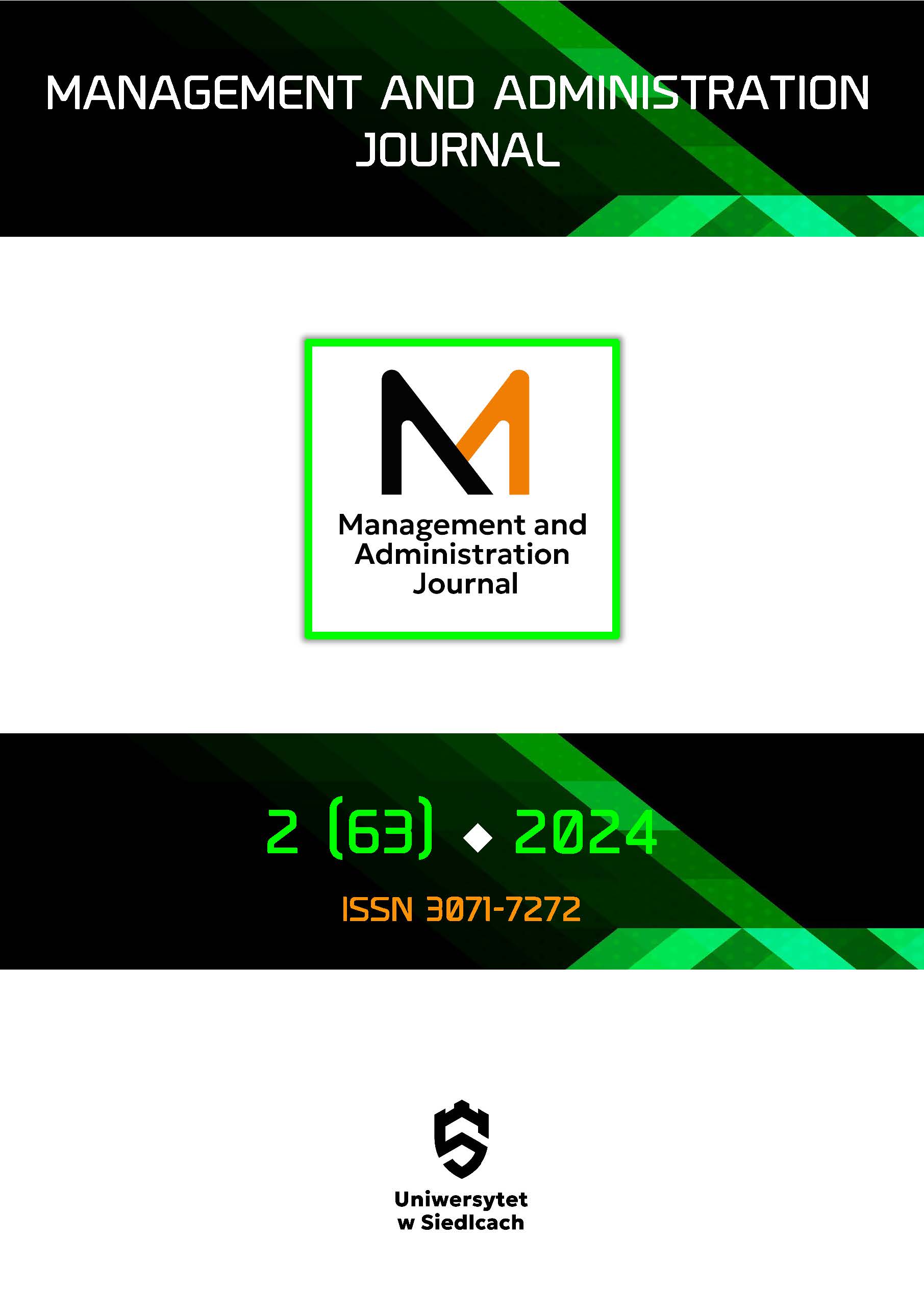PRZEGLĄD I ANALIZA ŚWIATOWYCH BADAŃ DOTYCZĄCYCH ŚWIADOMOŚCI ZDROWOTNEJ WŚRÓD GRUP STUDENTÓW
DOI:
https://doi.org/10.34739/maj.2024.02.10Słowa kluczowe:
świadomość zdrowotna, kompetencje zdrowotne, koszty zdrowotne, badania studentów, wsparcie systemowe, sytuacja społeczno-ekonomicznaAbstrakt
Health Literacy czyli świadomość zdrowotna jest nieodzowną kompetencją człowieka XXI wieku. Umożliwia zrozumienie sensu działań profilaktycznych, diagnostycznych i terapeutycznych, co przekłada się na większą kontrolę nad własnym zdrowiem. Dbałość o rozwój osobistej świadomości zdrowotnej to inwestycja w zdrowie, która przynosi korzyści zarówno
jednostce, jak i całemu społeczeństwu. Dlatego ważnym tematem jest badanie kompetencji zdrowotnych wśród studentów, którzy odpowiadają za swoje życie, ale również będą wpływać na życie innych. W artykule przyjęto za cel analizę badań ze świata
nad tematem Health Literacy wśród studentów. Z przeanalizowanych badań wynika, że istnieją silne dowody na związek między kompetencjami zdrowotnymi a takimi czynnikami jak wiek, semestr nauki, płeć, kierunek studiów, wykształcenie rodziców oraz status społeczno-ekonomiczny. Inne potencjalne determinanty mogą obejmować dostęp do informacji, doświadczenia związane ze zdrowiem, sytuację finansową, wsparcie społeczne. Ograniczona świadomość zdrowotna stanowi istotne wyzwanie dla polityki i edukacji zdrowotnej na całym świecie, choć w różnym stopniu w poszczególnych krajach. Z badań należy wyciągnąć wnioski, jakie grupy wymagają wsparcia systemowego podnoszącego kompetencje zdrowotne.
Pobrania
Bibliografia
Bánfai-Csonka, H., Bánfai, B., Jeges, S., Betlehem, J. (2022). Understanding Health Literacy among University Health Science Students of Different Nationalities. Int. J. Environ. Res. Public Health (19), 11758. DOI:10.3390/ ijerph191811758.
Birimoglu Okuyan, C., Caglar, S. (2019). Investigation of health literacy levels and health perceptions of nursing students: a cross-sectional study. Int J Caring Sci. (12), 270-279. http://www. internationaljournalofcaringsciences.org/docs/30_biri-moglu_original_ 12-1_1.pdf.
Budhathoki, S.S., Pokharel, P.K., Jha, N., Moselen, E., Dixon, R., Bhattachan, M., et al. (2019). Health literacy of future healthcare professionals: a cross-sectional study among health sciences students in Nepal. Int Health. (11), p. 15-23. DOI:10.1093/inthealth/ihy090.
Elsborg, L., Krossdal, F., Kayser, L. (2017). Health literacy among Danish university students enrolled in health-related study programmes. Scand J Public Health (45), 831-838. DOI:10.1177/1403494817733356.
Göring, A., Rudolph, S. (2015). Die Gesundheitskompetenz von Studierenden in Abhängigkeit von sportlicher Aktivität. in: A. Göring, D. Möllenbeck (Eds.) Bewegungsorientierte Gesundheitsförderung an Hochschulen. Göttingen: Universitätsverlag Göttingen (pp. 147-165). DOI:10.17875/gup2015-811.
Iwanowicz, E. (2009). „Health Literacy” współczesnym wyzwaniem zdrowia publicznego [„Health Literacy” as one Contempo-rary Public Health Challenges]. Medycyna Pracy 60(5), 427-437. http://medpr.imp.lodz.pl.
Kaboudi, M., Kianipou, N., Ziapour, A., Dehngan, F. (2017). A study of health literacy components and their relationship with health-promotin behaviors among students at kermanshah university of medical sciences in 2017. Int J Pediatr. (5), 6721-6729. DOI: 10.22038/ijp.2017.26823.2313.
Korzeniowska, E. (1997). Zachowania i świadomość zdrowotna w sferze pracy (pp. 50-61). [Health behaviour and Health Lite-racy in the sphere of work]. Łódź: Instytut Medycyny Pracy im. Prof. Dra Med. Jerzego Nofera. Krajowe Centrum Promocji Zdrowia w Miejscu Pracy.
Kühn, L., Bachert, Ph., Hildebrand, C., Kunkel, J., Reitermayer, J.,Wäsche, H., Woll, A. (2021). Health Literacy Among University Students: A Systematic Review of Cross-Sectional Studies, Sec. Public Health Education and Promotion (9). DOI:10.3389/ fpubh.2021.680999.
Kushalnagar, P., Ryan, C., Smith, S., Kushalnagar, R. (2018). Critical health literacy in American deaf college students. Health Promot Int. (33), 827-833. DOI:10.1093/heapro/dax022.
Levin-Zamir, D., Peterburg, Y. (2001). Health literacy in health systems: perspectives on patient self management in Israel. Health Promot. Int. (16), 87-94.
Mullan, J., Burns, P., Weston, K., McLennan, P., Rich, W., Crowther, S., et al. (2017) Health literacy amongst health professional university students: a study using the health literacy questionnaire. Education Sciences (7) 54. DOI: 10.3390/educsci7020054.
Nutbeam, D., (2000). Health literacy as a public health goal: a challenge for contemporary health education and communication strategies into 21st century. Health Promot. Int. (15), 259-267.
Nutbeam, D. (1998). Health promotion glossary. Health Promot. Int. (13) 349-364.
Rababah, J.A., Al-Hammouri, M.M., Drew, B.L., Aldalaykeh, M. (2019). Health literacy: exploring disparities among college students. BMC Public Health (19). DOI:10.1186/s12889-019-7781-2.
Reick, S., Hering, T. (2018). Health literacy of students. Results of an online survey at the Bochum health university (Germany) /Gesundheitskompetenz Studierender – Ergebnisse einer Online-Befragung an der Hochschule für Gesundheit Bochum. Int. J. Health (5), 44-52. DOI:10.2478/ijhp-2018-0007.
Runk, L., Durham, J., Vongxay, V., Sychareun, V. (2016). Measuring health literacy in university students in Vientiane, Lao PDR. Health Promot Int. (32), 360-368. DOI:10.1093/heapro/daw087.
Santos, P., Sa, L., Couto, L., Hespanhol, A.P. (2018). Sources of information in health education: a cross-sectional study in Portuguese university students. Med Stud J Aust. 11. DOI:10.21767/AMJ.2018.3435.
Schricker, J., Rathmann, K., Dadaczynski, K. (2019). Soziale Unterschiede in der gesundheitskompetenz von studierenden: ergebnisse einer online-studie an der technischen universität dortmund. Prävention und Gesundheitsförderung (15) 8-14. DOI: 10.1007/s11553-019-00731-6.
Schultes, K. (2017). Gesundheitskompetenz, subjektive Gesundheit und Gesundheitsverhalten bei Studierenden. Public Health Forum (25), 84-86. DOI: 10.1515/pubhef-2016-2115.
Simonds, S.K. (1974). Health education as social policy. Health Educ. Monogr. (2), 1-25.
Sørensen, K., Pelikan, J., Röthlin, F., Ganahl, K., Slonska, Z., Doyle, G., Fullam, J., Kondilis, B., Agrafiotis, D., Uiters, E., Falcon, M., Mensing, M., Tchamov, K., van den Broucke, S. (2015). Brand on behalf of the HLS-EU Consortium. European Journal of Public Health (25) 6, 1053-1058. DOI:10.1093/eurpub/ckv043.
Sorensen, K., Van den Broucke, S. Pelikan, J. (2013). Measuring health literacy in populations: illuminating the design and development process of HLS-EU-Q. BMC Public Health (13) 948.
Sukys, S., Cesnaitiene, V.J., Ossowsky, Z.M. (2017). Is Health Education at University Associated with Students’ Health Literacy? Evidence from Cross-Sectional Study Applying HLS-EU-Q. BioMed Research International (2017) 1-9. DOI: 10.1155/2017/ 8516843.
Suri, V.R., Majid, S., Chang, Y.K., Foo, S. (2016). Assessing the influence of health literacy on health information behaviors: a multi-domain skills-based approach. Patient Educ Couns. (99), 1038-45. DOI: 10.1016/j.pec.2015.12.017.
Vamos, S., Yeung, P., Bruckermann, T., Moselen, E.F., Dixon, R., Osborne, R.H. (2016). Exploring health literacy profiles of Texas university students. Health Behavior and Policy Review (3) 209-225. DOI: 10.14485/HBPR.3.3.3.
Pobrania
Opublikowane
Numer
Dział
Licencja
Prawa autorskie (c) 2024 Management and Administration Journal

Utwór dostępny jest na licencji Creative Commons Uznanie autorstwa – Użycie niekomercyjne 4.0 Międzynarodowe.





